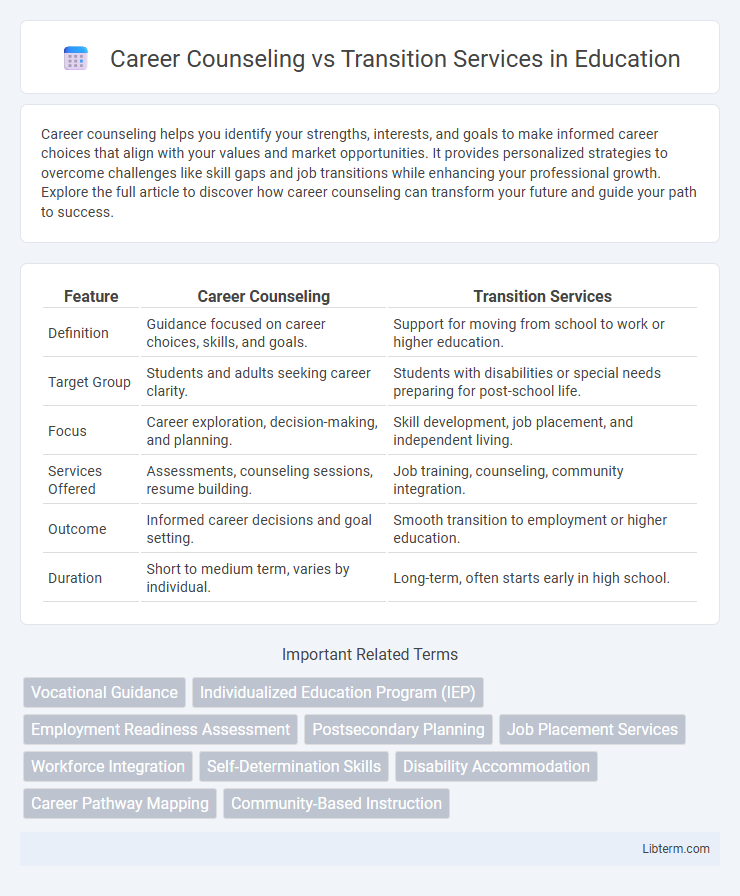Career counseling helps you identify your strengths, interests, and goals to make informed career choices that align with your values and market opportunities. It provides personalized strategies to overcome challenges like skill gaps and job transitions while enhancing your professional growth. Explore the full article to discover how career counseling can transform your future and guide your path to success.
Table of Comparison
| Feature | Career Counseling | Transition Services |
|---|---|---|
| Definition | Guidance focused on career choices, skills, and goals. | Support for moving from school to work or higher education. |
| Target Group | Students and adults seeking career clarity. | Students with disabilities or special needs preparing for post-school life. |
| Focus | Career exploration, decision-making, and planning. | Skill development, job placement, and independent living. |
| Services Offered | Assessments, counseling sessions, resume building. | Job training, counseling, community integration. |
| Outcome | Informed career decisions and goal setting. | Smooth transition to employment or higher education. |
| Duration | Short to medium term, varies by individual. | Long-term, often starts early in high school. |
Understanding Career Counseling
Career counseling involves personalized guidance to help individuals identify their strengths, interests, and career goals, facilitating informed decision-making about education and job opportunities. This process uses assessments, interviews, and goal-setting strategies to align personal skills with market demands. Understanding career counseling is crucial for those seeking tailored support to navigate career paths and improve long-term professional satisfaction.
Defining Transition Services
Transition services encompass a coordinated set of activities designed to support students with disabilities as they move from school to post-school environments, including higher education, employment, and independent living. These services focus on developing skills related to vocational training, life management, and self-advocacy, tailored to individual needs outlined in an Individualized Education Program (IEP). Unlike career counseling, which primarily guides career choices and job search strategies, transition services offer a comprehensive approach that integrates education, community experiences, and related support services for successful adult integration.
Key Differences between Career Counseling and Transition Services
Career counseling focuses on helping individuals identify career goals, develop job search skills, and make informed career decisions through assessments and personalized guidance. Transition services assist individuals, particularly those with disabilities or youth aging out of systems, by providing support in moving from school to work or between different life stages, including job training and workplace accommodations. The key difference lies in career counseling targeting personal career planning and decision-making, while transition services offer comprehensive support for successfully adapting to new employment or educational environments.
Target Audiences for Each Service
Career counseling primarily targets individuals seeking guidance on educational paths, career choices, and skill development, including students, job seekers, and professionals looking to change fields. Transition services focus on supporting specific groups such as veterans, individuals with disabilities, and those re-entering the workforce after unemployment or incarceration by providing tailored resources for smooth integration. Both services address career development but differ in their approach and specialized target audiences.
Core Objectives and Goals
Career counseling focuses on helping individuals identify their strengths, interests, and career paths through personalized guidance and skill assessment. Transition services aim to support individuals, especially those with disabilities or facing major life changes, in gaining employment and achieving self-sufficiency by providing practical resources and training. Both emphasize enhancing employability but differ as career counseling targets informed decision-making while transition services prioritize hands-on support for effective workplace integration.
Essential Skills and Tools Used
Career counseling emphasizes personalized assessments, goal setting, and self-exploration tools such as interest inventories and personality assessments to guide career decisions. Transition services prioritize practical skill development, including resume writing, interview preparation, and job search techniques, to support individuals moving between educational settings, jobs, or life stages. Both approaches integrate digital platforms and communication tools to enhance client engagement and track progress effectively.
Role of Counselors and Service Providers
Career counselors primarily guide individuals in identifying career interests, skills, and goals through assessments and personalized plans, facilitating informed decision-making and job readiness. Transition service providers focus on supporting clients during key life changes, such as moving from education to employment or military to civilian careers, by offering resources like skill development, job placement, and access to community supports. Both roles collaborate to address clients' unique needs, ensuring a smooth progression toward sustainable employment and personal growth.
Integration in Educational Settings
Career counseling supports students by identifying strengths, interests, and goals to guide academic and vocational choices, enhancing integration within educational settings. Transition services provide structured support for students with disabilities, focusing on skill development, goal setting, and coordinated resources to promote successful movement from school to post-school environments. Both approaches emphasize personalized planning and collaboration among educators, families, and community agencies to ensure seamless integration and long-term success in education and career pathways.
Case Studies: Success Stories
Case studies reveal that career counseling successfully guides individuals in identifying strengths and aligning them with suitable job opportunities, resulting in higher employment rates and job satisfaction. Transition services demonstrate effectiveness by providing tailored support during major life changes, such as military-to-civilian shifts or college-to-work transitions, enhancing clients' adaptability and long-term career stability. Both approaches showcase measurable success in improving clients' career outcomes through personalized strategies and evidence-based interventions.
Choosing the Right Support for Your Needs
Career counseling provides personalized guidance focusing on skill assessment, goal setting, and job search strategies to help individuals clarify their career paths. Transition services offer structured support during major life changes, such as moving from school to work or military to civilian life, emphasizing practical resources like training, resume building, and networking opportunities. Selecting the right support depends on whether you need tailored career planning or comprehensive assistance navigating a significant employment transition.
Career Counseling Infographic

 libterm.com
libterm.com